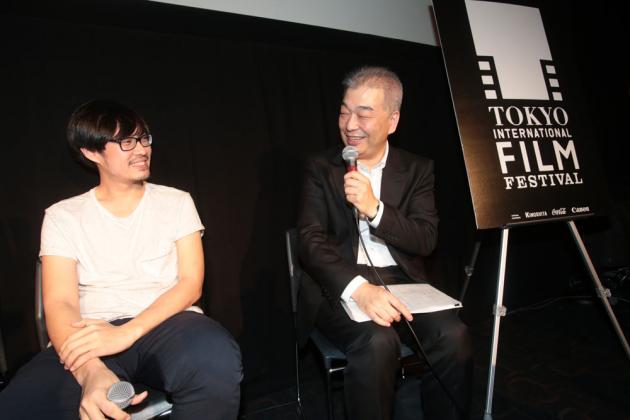Drinking in the Thai spirit

A new section of the Tokyo International Film Festival brings Thai cinema to Japanese audiences
The 27th edition of the Tokyo International Film Festival wrapped on Friday with the presentation of the Sakura Grand Prize to “Heaven Knows What”, a Franco-American production by sibling filmmakers Josh and Ben Safdie that explores the loves and lives of drug addicts.
The only Japanese festival to be recognised by the FIAPF (International Federation of Film Producers Associations), this year’s edition saw the addition of several new events including Crosscut Asia, a special section under the auspices of Japan Foundation’s Asia Centre. The centre, which was set up earlier this year, will collaborate with the festival in searching for and programming Asian films on various themes through 2020 and kicked off its involvement by bringing eight Thai films to the attention of Japanese viewers.
“Thai cinema has a variety of films. It is not difficult to package them into one special programme,” says the festival’s director general Yasushi Shiina, adding that one of his favourite films of all time is “Bangkok Dangerous”.
For his part, the festival’s director of programming, Kenji Ishizaka, is delighted to see Thailand back in the spotlight, explaining that he worked with the Japan Foundation for 17 years and has been responsible for two Thai film festivals in his native land, the first in 1990 and the second 2003.
“For the first Thai film festival, we invited MC Chatrichalerm Yukol, Cherd Songsri, Piak Poster and Manop Udomdej and we screened 16 films by Thai veteran filmmakers,” he recalls.
“I have many good memories of working with people in the Thai film industry and it felt like high time we organised another mini Thai film festival here as part of the bigger event. This year, we focused on films made in the last three years and selected a total of eight from both mainstream and independent studios.
“Our choice included ‘Teacher’s Diary’ and ‘Timeline’ along with the indie titles ‘36’ and ‘Tang Wong’. We also picked the Urupong Raksasat’s documentary ‘The Song of Rice’ in a nod to the acclaim garnered by his earlier ‘Agrarian Utopia’ at the Yamagata International Documentary Film Festival.
“‘Teacher's Diary’ is a very romantic story, and its director Nithiwat Tharatorn was introduced to Japanese audiences with the commercial release of “My Girl” (“Fan Chan”). Nonzee Nimibutr is probably the best known Thai director in Japan and his ‘Nang Nak’ was a big hit here, so film fans were eagerly awaiting his new film. Also ‘Timeline’ was shot in Kyushu’s Saga prefecture.
“Lee Chatametikool made a name for himself as the editor of Apichatpong Weerasethakul films, so people were interested in seeing his directorial debut ‘Concrete Clouds’,” Ishizaka explains.
Another pick was “Last Summer” from Talent One Movie Studio, which Ishizaka describes as a good example of new horror titles from the Kingdom. Actress Sutatta Udomsilp and producer Rutaiwan Wongsirasawad flew in to Tokyo to present the film and take part in the Q&A session.
Japanese audiences also had the chance to see –or, in some cases, see again – Kittikorn Liawsirikul's “Khoo Kam” (“Sun and Sunrise”). M-Thirty Nine’s film was first screened in Tokyo not long after its Thai release in April 2013 and Ishizaka says it was an obvious choice for Crosscuts Asia, given that in 1988, Ruj Ronaphob’s version of the film played at Tokyo International Film Festival.
“The original novel was translated into Japanese and the Japanese people know this important story about the relationship between the two countries very well. Kittikorn is not unknown to filmgoers here either. His 2001 film ‘Goal Club’ was also screened in competition at the festival,” says Ishizaka
“And I love Kongdej's film very much,” he continues, referring to the director’s award-winning drama “Tang Wong”.
“Another indie hit, ‘36’ was also screened here in response to the audience’s request to watch other films by Nawapol Thamrongrattanarit, whose ‘Mary is Happy, Mary is Happy’ screened at last year’s edition of the festival was a major hit.”
Nawapol, who was in Tokyo for the screening, adds that the audience seemed to also like “36”.
“Most of the audience had watched ‘Mary’ and during the Q&A session, I was asked if I had met the real Mary Malony. I had to admit I hadn’t. I am surprised though that the Japanese fans are tweeting about ‘36’ more than they did about ‘Mary’,” Nawapol says.
So will there be Thai films at the 2015 edition of the festival? While Ishizaka doesn’t exclude this and confirms that Crosscut Asia will continues, he says that in the years to come, the section will probably focus on films from other Southeast Asian countries.
“We will have to discuss which country will be highlighted for the next one Crosscut Asia,” he says.





